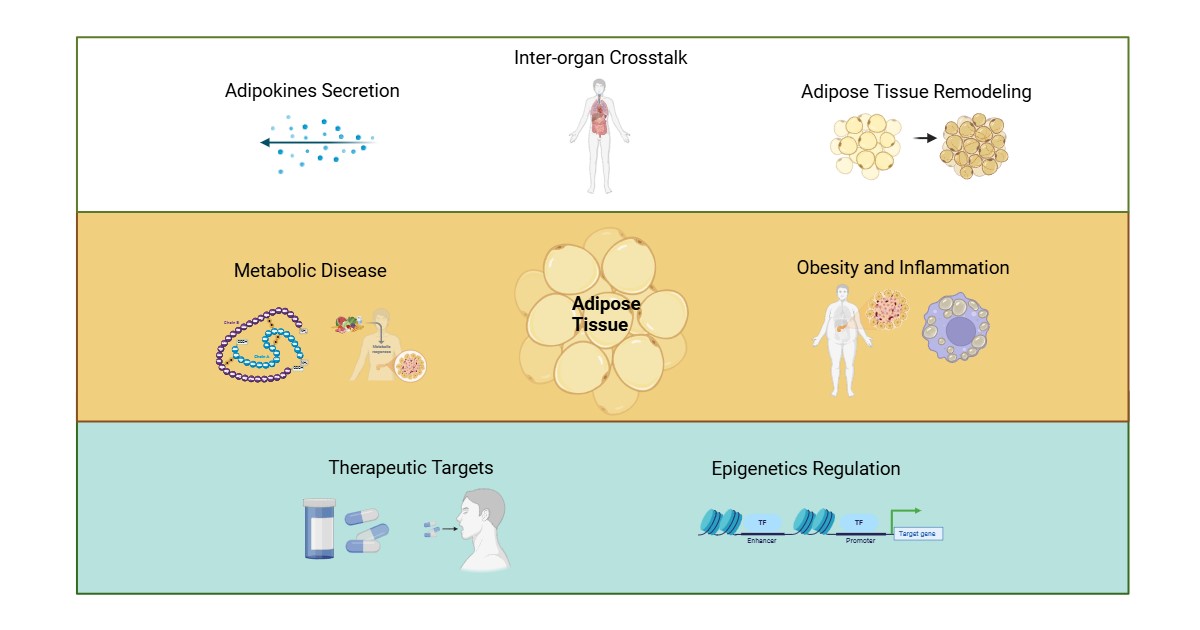Adipose Tissue Functioning in Health and Diseases
A special issue of Cells (ISSN 2073-4409). This special issue belongs to the section "Tissues and Organs".
Deadline for manuscript submissions: 28 February 2026 | Viewed by 4731

Special Issue Editor
Interests: obesogenic effects on metabolic health and transgenerational impacts; cellular and molecular mechanisms of adipogenesis; epigenetic regulation in metabolic diseases; role of microRNAs in inflammation and obesity; metabolic adaptation and programming in response to environmental exposures; endocrine and immune system interactions in metabolic regulation; high-fat diet-induced metabolic dysfunctions; chromatin dynamics in transgenerational epigenetic inheritance; preconception environmental exposures and their effects on offspring metabolism
Special Issue Information
Dear Colleagues,
Adipose tissue plays a critical role in maintaining metabolic homeostasis and energy balance. Beyond serving as a storage depot for lipids, it functions as an endocrine organ that regulates various physiological processes through the secretion of adipokines and cytokines. However, dysregulation in adipose tissue function is implicated in the pathogenesis of obesity, diabetes, cardiovascular diseases, and other metabolic disorders. This Special Issue, Adipose Tissue Functioning in Health and Diseases, highlights innovative research exploring the cellular and molecular mechanisms governing adipose tissue function, its interactions with other tissues, and its role in disease development. We invite contributions that examine adipose tissue remodeling, thermogenic regulation, metabolic crosstalk, and therapeutic approaches targeting adipose tissue. By assembling diverse perspectives and novel findings, this issue seeks to provide a comprehensive understanding of adipose tissue’s role in health and disease.
Dr. Richard C Chang
Guest Editor
Manuscript Submission Information
Manuscripts should be submitted online at www.mdpi.com by registering and logging in to this website. Once you are registered, click here to go to the submission form. Manuscripts can be submitted until the deadline. All submissions that pass pre-check are peer-reviewed. Accepted papers will be published continuously in the journal (as soon as accepted) and will be listed together on the special issue website. Research articles, review articles as well as short communications are invited. For planned papers, a title and short abstract (about 250 words) can be sent to the Editorial Office for assessment.
Submitted manuscripts should not have been published previously, nor be under consideration for publication elsewhere (except conference proceedings papers). All manuscripts are thoroughly refereed through a single-blind peer-review process. A guide for authors and other relevant information for submission of manuscripts is available on the Instructions for Authors page. Cells is an international peer-reviewed open access semimonthly journal published by MDPI.
Please visit the Instructions for Authors page before submitting a manuscript. The Article Processing Charge (APC) for publication in this open access journal is 2700 CHF (Swiss Francs). Submitted papers should be well formatted and use good English. Authors may use MDPI's English editing service prior to publication or during author revisions.
Keywords
- adipose tissue biology
- adipogenesis
- lipolysis
- adipose tissue inflammation
- diet-induced obesity
- non-coding RNA in metabolism
- PPARγ signaling
- metabolic health and disease
- obesogens
- epigenetics and chromatin regulation
- transgenerational inheritance
Benefits of Publishing in a Special Issue
- Ease of navigation: Grouping papers by topic helps scholars navigate broad scope journals more efficiently.
- Greater discoverability: Special Issues support the reach and impact of scientific research. Articles in Special Issues are more discoverable and cited more frequently.
- Expansion of research network: Special Issues facilitate connections among authors, fostering scientific collaborations.
- External promotion: Articles in Special Issues are often promoted through the journal's social media, increasing their visibility.
- Reprint: MDPI Books provides the opportunity to republish successful Special Issues in book format, both online and in print.
Further information on MDPI's Special Issue policies can be found here.






